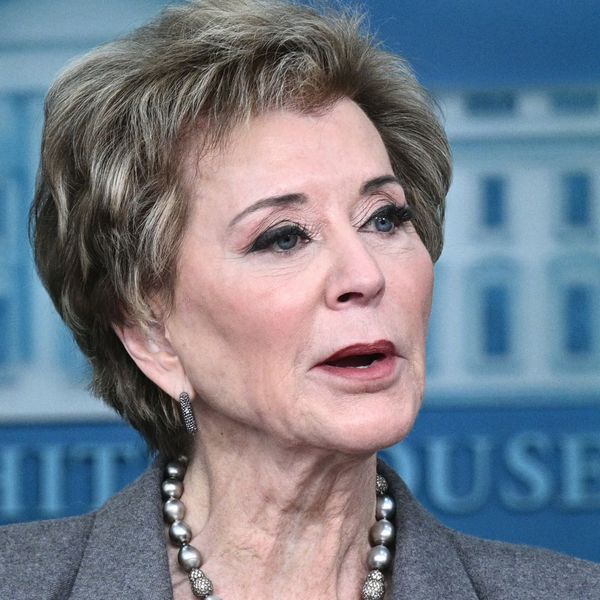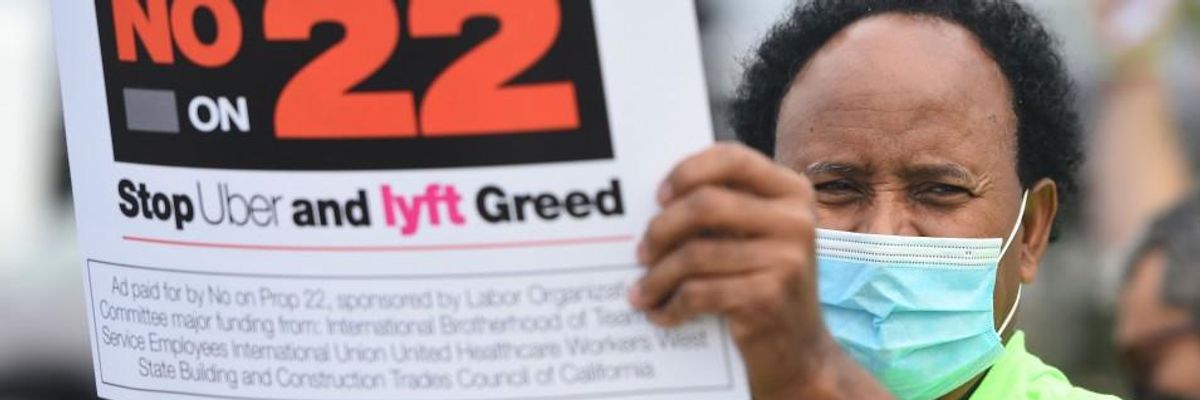Like so much about politics today, the debate around Uber and Lyft's Proposition 22 in California has quickly become polarized. Simplistic media narratives like "Silicon Valley versus labor unions," or Uber's self-serving argument that its drivers prefer flexibility over security, leave voters confused and torn.
Uber and Lyft's nearly $200 million ballot measure will overturn one of the most important labor laws passed in the US in several decades. It also will perpetuate the second-class economic status of its large taxi driver workforce. Many of these Uber and Lyft drivers have not been earning California's minimum wage after drivers subtract their considerable driving expenses. Nor does Uber or Lyft provide any kind of safety net with health care, sick leave, injured worker or unemployment compensation.
Proposition 22 makes only the most token, face-saving effort to bridge this gap in wage and living standards. In exchange, it would wipe out the rights and benefits drivers' will gain by remaining classified as "employees" rather than "independent contractors," if Proposition 22 is voted down. Even worse, it would lock in this serf-like condition forever, since Prop 22 requires an unprecedented 88% vote by the state legislature to change it.
Yes, the future of work is changing, and the labor laws must adapt, as the CEOs of Uber and Lyft asserted recently in a joint op-ed. Yet these companies have consistently missed numerous opportunities to act as good-faith partners for their drivers, and for society in general.
Uber's Pocket Change
I have personally witnessed these companies' failings. After my book Raw Deal: How the Uber Economy and Runaway Capitalism Are Screwing American Workers was published, I was asked to a meeting with high level Uber representatives. Previously I also had been part of a meeting with Lyft leaders. A central part of these discussions was my proposal calling for a "portable safety net" for their drivers, and for other types of freelance workers.
With a portable safety net, each worker would have an Individual Security Account into which any business that hires that worker would contribute an amount pro-rated to the number of hours worked for that business. Those funds then would be used by that worker to pay for her or his safety net needs, such as healthcare, Social Security, sick leave, injured worker and unemployment compensation. Instead of pitting flexibility against security, a portable safety net would allow not only flexible work, but also the economic security that workers and their families need.
A number of countries already do something like this, and President Barack Obama endorsed my idea in his 2016 State of the Union address. A statement of principles was signed by forty business, government, labor and NGO leaders -- including the president and CEO of Lyft, John Zimmer and Logan Green -- calling for a portable safety net as a foundation for the future of work in the 21st century economy. Uber CEO Dara Khosrowshahi also has called for enacting a portable safety net plan.
It seemed like this had the makings of a win-win solution. But when legislative bills were introduced for a portable safety net in the states of Washington, New York and New Jersey, Uber and Lyft came to the bargaining table offering pocket change. Rather than contributing 20% of a worker's wage that is necessary to fund an adequate safety net, Uber and Lyft offered to contribute 2.5%. And they wanted their contributions to be voluntary. In all three states the legislation died because these billion-dollar companies frittered away real opportunities.
When California legislation was proposed, Uber and Lyft once again countered with a paltry portable benefits package. With no serious negotiating partner on the other side, the California legislature overwhelmingly passed AB 5 to reclassify drivers as employees rather than independent contractors. Now it's the law, but Uber and Lyft have refused to implement it.
This has resulted in multiple lawsuits and legal judgments against these renegade companies. One study found that if their drivers had been classified as employees these last five years, Uber and Lyft would have paid more than $400 million into the state unemployment insurance fund. Instead, California taxpayers have footed the bill for the significant wage and benefit gaps created by these companies and their crummy gig jobs.
These bitter losses prompted Uber and Lyft to join with DoorDash and InstaCart to spend $190 million (and counting) -- the highest amount for a ballot proposition in California history -- to try and pass Proposition 22.
A Broken Business Model
One can't help but wonder why these multibillion dollar companies, who can dig deep into their piggy banks to spend on this ruinous ballot measure but not on their drivers, consistently come to the bargaining table offering pocket change. Well, there's more to this story.
It turns out that, despite how badly they underpay and mistreat their drivers, Uber and Lyft are still in huge financial trouble. They have been losing billions of dollars every year, even as their stocks have collapsed. Profit margins are inherently low in the taxi business, and their predatory business model massively subsidizes more than half the cost of each and every ride in their bid to boost market share and undercut the competition. As a result, traditional taxi companies and livery drivers have been pushed to the desperate edge of bankruptcy, and airport shuttle companies have been driven out of business.
Public transportation also has been damaged. Even before the COVID pandemic, public transit ridership in most major cities had declined, as commuters opted for half-priced Uber and Lyft rides over the mass ridership experience. One of the most ambitious studies of ridesharing impacts, conducted by researchers at the University of California-Davis' Institute of Transportation Studies, found that ridesharing results in a dramatic rise in the number of trips made and miles driven in an automobile, as well as a pronounced reduction in the use of mass transit. All of that contributes greatly to increases in traffic congestion and carbon emissions.
Certainly for the small minority of people who use Uber and Lyft's subsidized rides, most of them younger, college-educated, urban-based and better-off Americans (their use is double the rate of less-educated, lower income people), this transportation option has been helpful. But for the vast majority who do not use these companies' services, and who ride on the bus or drive personal vehicles stuck in Uber-congested traffic, ride hailing's legacy has been decidedly negative. In short, ride hailing has been bad for most ride-hailing drivers, bad for congestion and traffic flow, and bad for public transportation.
Proposition 22 Will Lock in Serf-Like Working Conditions
So what are these companies offering with Proposition 22? Yet another miserly version of a portable safety net. For example, the value of Proposition 22's offered health benefit is about $1.20 an hour -- but that's well below the value of benefits mandated for employees under state and federal laws (which is more like $4 to $6 per hour, depending on the occupation). And most drivers would not be able to afford their share of the health care premiums, which would range from 20 to 60%.
Prop 22 also will not really offer higher wages because of a complex formula that will be used to determine "minimum wage." If you read the fine print, only "engaged hours" will be counted, meaning when they have a passenger in the car. All the downtime waiting for the next fare, or disinfecting cars between rides, or driving back from a remote drop-off location, will not be counted as hours worked when calculating the minimum wage.
Given that a recent study called "Empty Seats, Full Streets" showed that a third of drivers have empty cars as they circle for passengers, clogging the streets without any benefit to anyone, the net effect would mean much less than a real minimum wage. A study by the University of California-Berkeley's Labor Center found that, if Proposition 22 passes, many drivers could earn as little as $5.64 an hour once their considerable driving expenses are subtracted, not even half of California's minimum wage of $12 per hour.
In short, none of Prop 22's offerings come close to what drivers will receive if voters reject it and drivers remain regular employees instead of independent contractors. As employees, drivers would have the option of organizing a labor union and negotiating a contract locking in wages, benefits and working conditions; as independent contractors, federal law forbids union formation or collective bargaining. Even worse, Proposition 22 would make it impossible to change its prescribed working conditions, since it will require a ridiculously high 7/8 of a vote by the state legislature to modify it.
Uber and Lyft counter these criticisms by saying that if Proposition 22 fails, drivers will lose the flexibility to set their own schedules. But the current law, AB 5, does not in any way require this. Harvard Law School labor expert Benjamin Sachs says, "This argument gets the causal arrows backward" because if drivers become employees, Uber would not somehow then be required to exercise additional control over when and how long the drivers worked, or over other aspects of the job that are currently flexible.
Indeed, a number of occupations, such as carpenters, web developers, plumbers and others already combine a flexible schedule with regular employee status. In response to the COVID pandemic, most businesses have more employees working from home and flexibility has become a way of life for millions of workers. Yet Uber and Lyft, who like to brag about their high-tech innovation, can't figure out a way to retain flexibility for their drivers?
Uber and Lyft are their own worst enemies. They entered the taxi business over 10 years ago, breaking every law in the books, motivated by the Silicon Valley philosophy of "move fast and break things." Well they broke it, and now they can't figure out how to fix it.
As California Attorney General Xavier Becerra has said, "Any business model that relies on short-changing workers in order to make it probably shouldn't be anywhere, whether California or otherwise." Ride-hailing has been popular and seemingly has potential, but the public must insist that these companies not profit by shifting all the risk onto their workers and hurting the environment. The vote over Prop 22 is about making a stand for the type of jobs and businesses Californians want to see in their Golden State.



